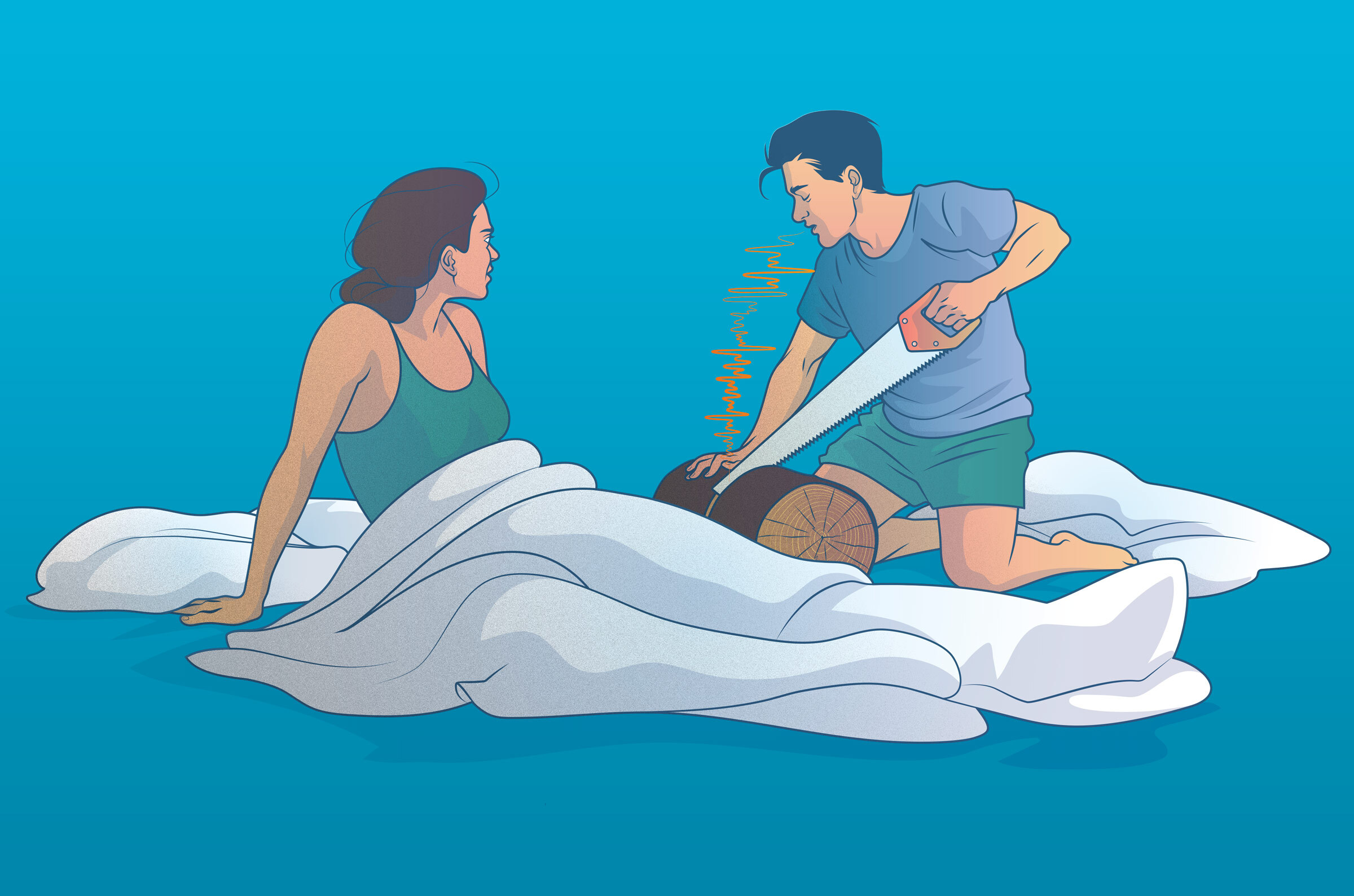Feeling like you can’t face another night of sleep deprivation? It can be a nightmare if you don’t know what to do if your partner snores.

The stress and resentment that partners of snorers feel can be overwhelming. Without effective solutions, you and your sleep partner may end up in separate bedrooms, or worse, your marriage may end in divorce.
Luckily, there are plenty of treatments, products, and devices that can reduce the symptoms of snoring so everyone gets a restful night.
Read on to discover what to do if your partner snores so that no-one ends up sleeping in the spare bedroom.
(Note. While we earn commission from the links in this article, we only recommend the products we truly believe will improve your sleep the most. These commissions come at no extra expense to you and help us to keep providing you with expert sleep information for free.)
The Issue with Snoring Partners
Here’s the truth: you’re more likely to hear someone moaning about their husband snoring than their wife. This is because 24 percent of men and 13 percent of women snore.
Snoring is a result of vibration in the upper part of the airway. It can be caused by your tongue, mouth, uvula, soft tissue palette, airways, or throat vibrating. The type of snorer that your partner is will depend on where the vibration is coming from.
Here’s the issue. Loud, intrusive snoring leads to sleep disruption and poor quality sleep for both the non-snorer and the snorer.
The problem for couples that share a bed is that one snorer can cause sleep deprivation for both people every night. Whether it’s your lack of sleep due to heavy breathing or the elbow in the ribs you give your partner, snoring leads to poor sleep.
The effects of poor sleep and chronic snoring can put a huge strain on a relationship, causing irritability, frustration, and conflict that leaks into other areas of your health.
As Dr. Diana Starovoytova puts it:
“Snoring can deprive a spouse/partner of sleep, which can not only lead to arguments, and lost-patience, but a spouse/partner also experience terrible physical and psychological effects, of sleep deprivation, such as fatigue, daytime sleepiness, clumsiness, or weight loss, or weight gain.”
Here’s What To Do If Your Partner Snores – 8 Anti-Snore Treatments
Struggling to get a full night of sleep because of your snoring partner?
Try these anti-snoring strategies for a better night’s rest.
1. Check for sleep apnea
Sleep apnea syndrome is a medical condition where the sufferer experiences disordered breathing and breathing pauses during the night. These pauses during sleep are often punctuated with choking sounds in the throat and loud snoring.
As Harvard Health Publications explains:
“Symptoms of obstructive sleep apnea include excessive sleepiness during waking hours. Loud snoring is another symptom, and the person’s bed partner may be the first to notice this problem.”
While mild sleep apnea may not be a problem, the dangers of sleep apnea can be severe if sufferers don’t get a diagnosis. The issue is that 80% of obstructive sleep apnea cases go undiagnosed. Untreated, this sleep-related breathing problem can pose a real health hazard.
Before trying any other snore solutions, visit an ear, nose, and throat doctor to check for sleep apnea.
2. Adjust their sleep position
According to sleep specialist, Dr. Harneet Walia:
“Sleeping on the back is more likely to be associated with snoring.”
As sleep expert, Sophie Bostock, explains further:
“Snoring gets worse when you lie on your back. When you lie on your back your mouth is more likely to open.
Basically, if your partner’s regular sleeping position is on their back, their mouth is more likely to open and their tongue is more likely to act as an airway obstruction. This increases the chances of snoring.
To remedy this, you need to encourage your partner or spouse to change their sleeping position.
One solution is to use an anti-snoring positional sleeping aid.
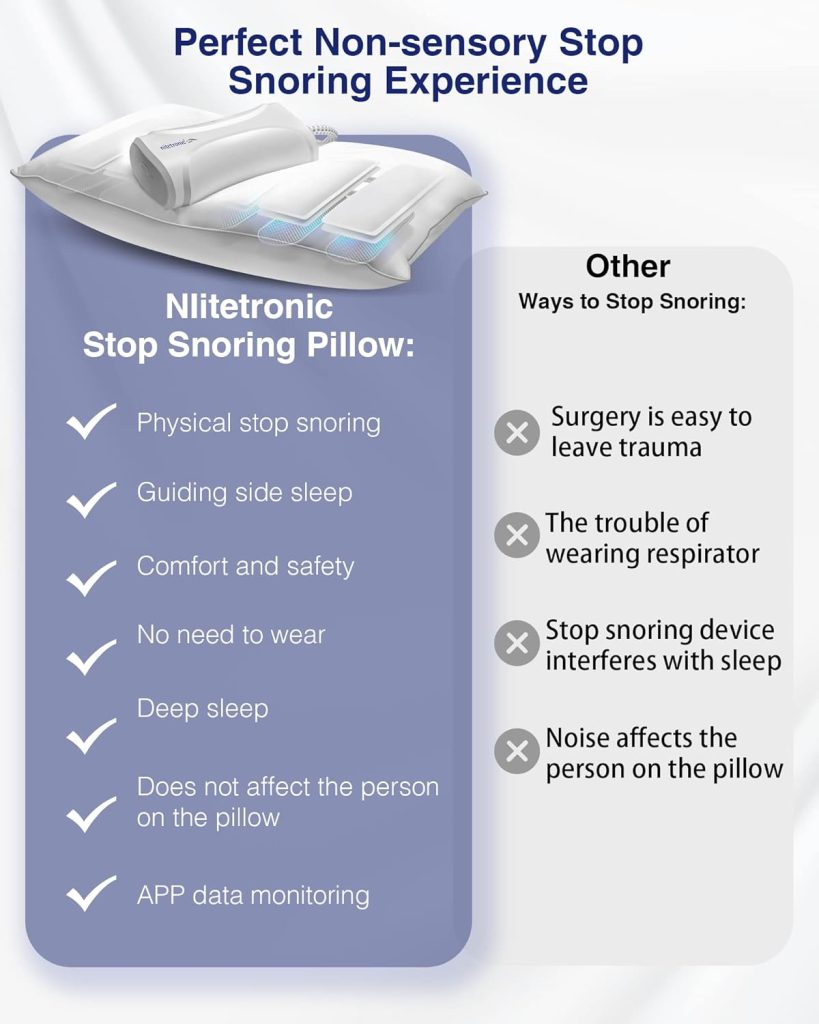
The Nitetronic Smart Anti-Snore Pillow has been clinically validated to reduce snoring by an average of 65%-85% per night, without adversely affecting sleep parameters. Experience quieter sleep with this intelligent pillow that gently turns your head to the side to create more space between your tongue and throat tissue, preventing soft tissue vibration and reducing snoring. With the Nitetronic Smart Anti-Snore Pillow, you can enjoy a more restful sleep and wake up feeling refreshed.
Alternatively, try the Smart Nora.
A small device that sits under the pillow, this snore solution listens out for the beginnings of snoring noises and kicks in when your partner starts to snore.
It raises the pillow slightly to change your partner’s position to relieve the airway obstruction and reduce throat vibrations.

According to Dr. Roy Raymann, VP of Sleep Science and Scientific Affairs at SleepScore Labs, it’s a highly effective anti-snore solution:
“Our validation study revealed that Smart Nora can help both snorers and their partners in getting better sleep as a result of decreased snoring.”
In fact, users say they experience a 30% reduction in sleep disruption when using a Smart Nora.
3. Wear anti-snore earplugs
Not all snoring solutions have to revolve around your spouse or bed partner. Partners of snorers can also find strategies to block out the sound of snoring from their husband, wife, or partner. After all, desperate times call for desperate measures.
A great trick for bedtime silence when you’re falling asleep is to use a pair of headphones or earplugs to reduce the volume of snoring noise.
While you could just purchase a cheap pair of earplugs, ZQuiet Flex-Fit Earplugs make a huge difference.
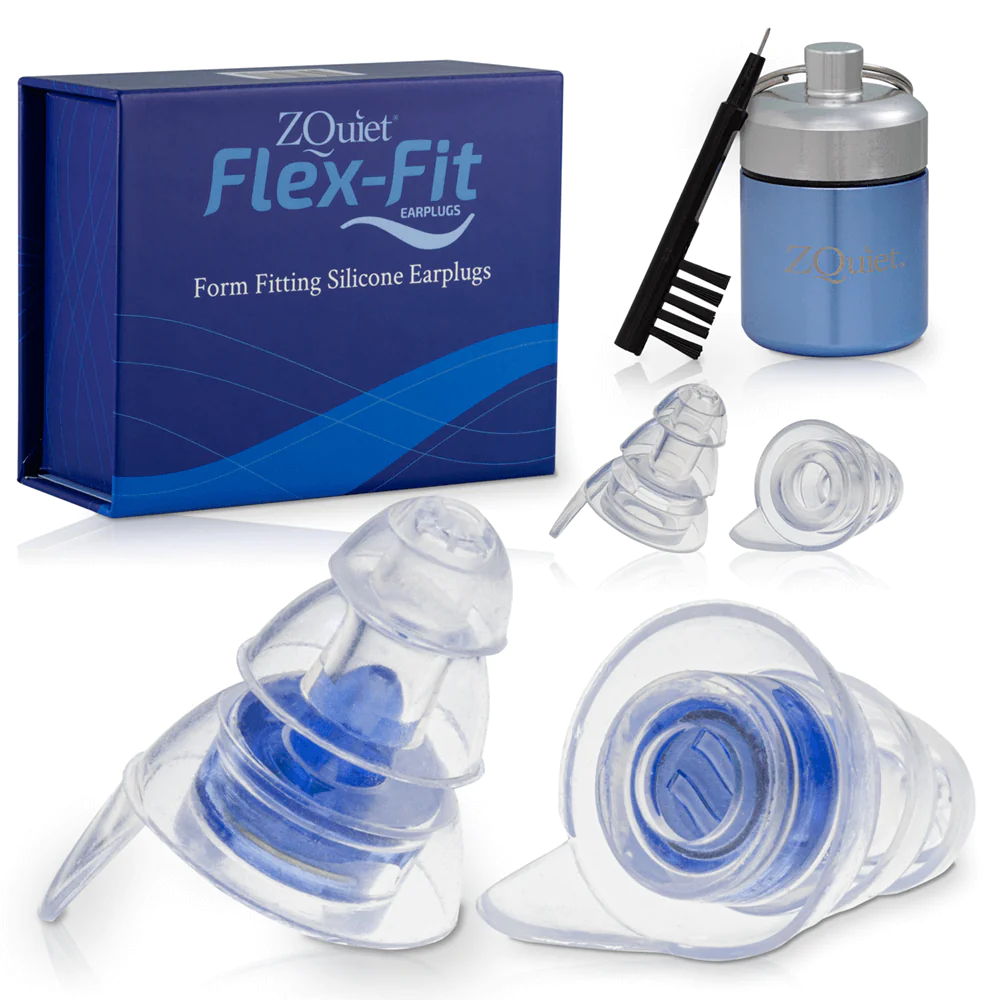
These earbuds work in two ways.
The comfortable, ergonomic design fits snugly in the ear to cut out the sound of your partner snoring.
At the same time, the earbuds listen to the sound outside your earbuds and then play a sound that’s the exact opposite of that external noise. By doing this, it cancels out the soundwaves, canceling out external noise.
As one user, Rachel P, puts it, these earbuds are “worth the investment”:
“[I] was able to sleep through the night without being woken up by my husband’s snoring”.
Another user, Linda B, gave these earbuds a five-star review, saying:
“These work so well. I would recommend them to anyone who sleeps with a snorer or even just a restless sleeper.”
4. Try an anti-snoring mouthpiece
For tongue snorers and mouth breathers, you’ll need snoring devices that help to relieve vibrations in the mouth.
You could try a mouth spray, which is said to reduce vibrations by coating the back of the throat with a thin layer of foam. Although, the medical director of the Snoring Center in Dallas, Dr. Craig Schwimmer, has said that snoring sprays are “almost completely useless”.
Instead, lots of snorers prefer to use a mouth guard. We tested a few and found SnoreMeds to be the best. Mandibular Advancement Devices, more commonly known as anti-snoring mouthpieces are recommended by professionals as effective devices to stop snoring.
It’s easy to use and comfortable to wear. Molding the mouthpiece takes just a few minutes for a perfect fit. You can sleep in any position and the mouthpiece Lasts up to a year.
While you can get custom-fitted dental devices made, you don’t need a specialized medical device to prevent yourself from mouth snoring.
This professional, anti-snoring mouthpiece gently repositions your lower jaw to allow a free flow of air preventing the vibration sound of snoring. It also stops the soft tissue and tongue from falling backward, partially blocking the airway while you sleep.
The SnoreMeds anti-snoring Mouthpiece is a highly-effective mouth guard that’s great at preventing snoring.

In fact, in a clinical study of the mouth guard, 70% of users said they would continue using the product after the study.
According to one user, Jose P, it’s a real game-changer:
“I have been using the SnoreMeds mouthpiece since 2012 and it changed my life and the life of my wife. It truly works to stop snoring most nights or at least dampen the sound.”
5. Test a nasal snoring solution
If your spouse or partner is a nose snorer, you’ll need a different snoring solution that helps to open up the nostrils so they can breathe more easily.
You may also find that when your partner gets a cold, their sinuses get smaller and the membranes swell. Since the nasal passage narrows, this can lead them to become a nose snorer.
Luckily, there are plenty of over-the-counter nasal snoring solutions that can help to widen the nostrils at bedtime so you and your partner get a more restful sleep.
One of the best solutions is the ZQuiet Anti-Snoring Nasal Breathing Aid.
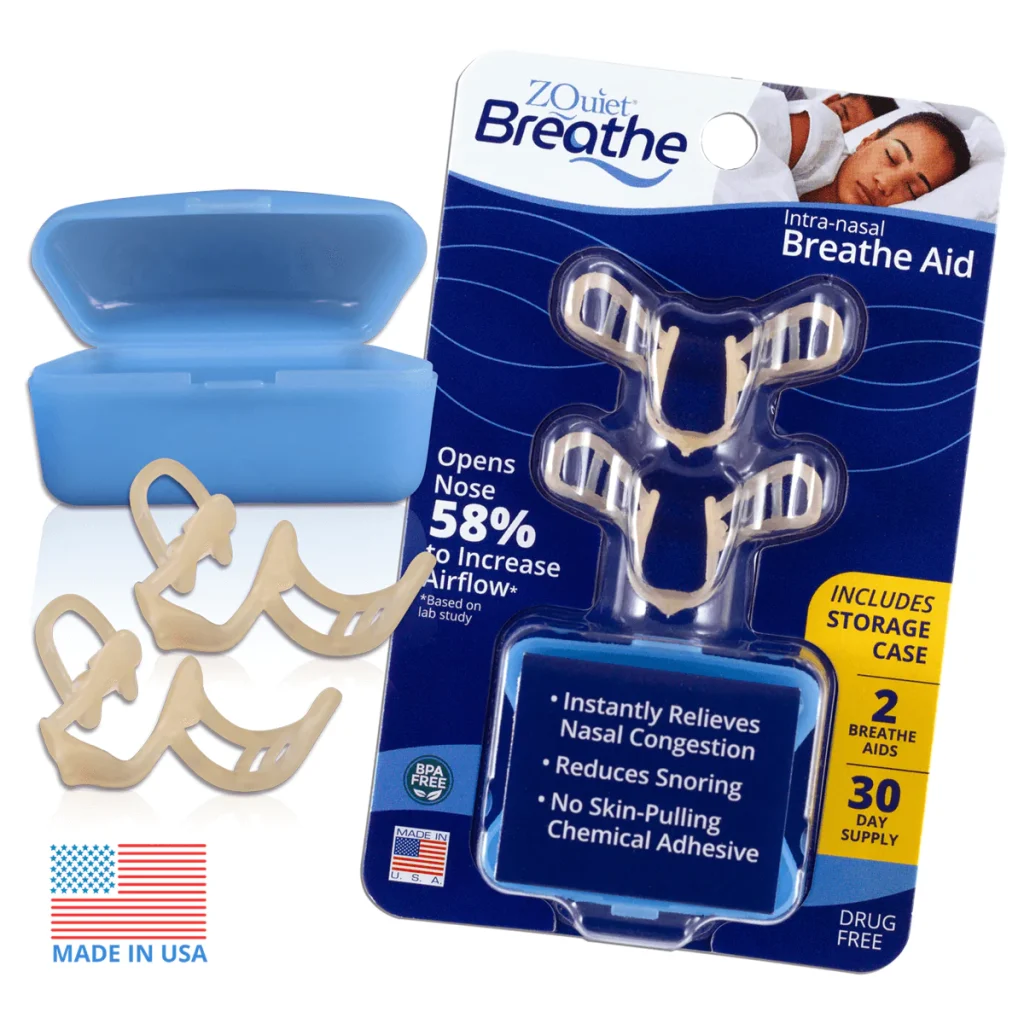
This device works by widening the nasal passages to increase the airflow into your partner’s nose, stopping the nasal passage from vibrating. The flexible wings on the device mean that it molds to fit the wearer perfectly.
As one user, John Y, puts it:
“[I’ve been] using Z Quiet for several years with successful results. Very comfortable and easy to clean and maintain the unit. I wholeheartedly recommend this product.”
Alternatively, you can try disposable snore strips.

Working on the same principle, snore strips go on your cheeks to pull the nostrils open to allow more air to flow into the noise.
6. Cut out the alcohol
It may not be a sleep disorder that’s causing your partner to snore — it could be alcohol intake.
Not only does regular drinking increase the risk of heart disease, heart attacks, high blood pressure, stroke, and diabetes, but it can also cause snoring.
Lots of people enjoy a little tipple of alcohol before bed to help induce drowsiness. Treating alcohol like behavioral sleep medicine, most people are fooled into thinking that a little alcohol before bedtime is an effective nightcap.
The problem is that alcohol isn’t the answer. Instead of helping you get deep sleep, alcohol actually increases sleep loss and sleep disturbances. Not only that but a recent sleep study proves that alcohol worsens snoring.
7. Use a white noise machine
Another way to drown out the sound of your partner’s snoring is to use white noise machines. They not only block out annoying noise, but they also calm your mind, so your head is in a better space for a deeper sleep.
As Dr. Harshi Dhingra explains:
“A white noise machine is also known as a sound machine. It helps in creating a more calming environment for the onset and stability of sleep that promotes better health and performance at work.”
White noise machines work by using stochastic resonance to mask external sound.
As Dr. Dhingra explains further:
“[White noise] is a noise that is made up of low medium and high frequencies played at the same levels of intensities. The white noise makes the hearing threshold level to its maximum, which causes intense stimulation of the auditory senses causing less perception by the brain and masking other environmental sounds in the background.”
Try the Yogasleep Dohm Classic – Original White Noise Machine
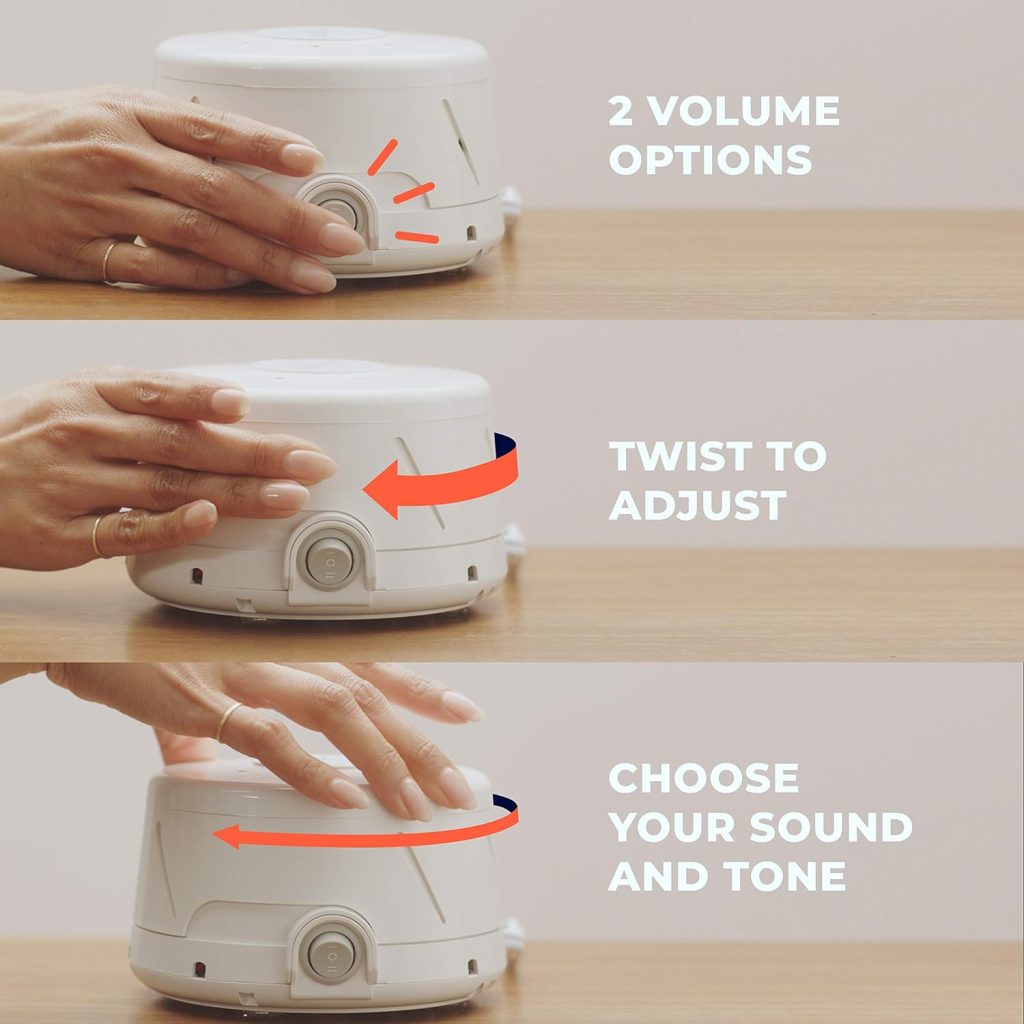
Not only does it have a few different white noise sounds to help you drift off, but it also has a number of other soothing sounds to block out your partner’s snoring.
As one user, Brian D, puts it:
“Love the YogaSleep machine. My husband has to have it on every night, no matter what. The sound is awesome and drowns out everything around. [It] makes sleeping so much more peaceful!”
8. Encourage weight loss
Is your partner carrying a little excess body weight? If that’s the case, you should encourage them to lose a bit of weight as being overweight is a snoring risk.
Not only does obesity and excess fatty tissue put you at risk of a stroke, but adults who aren’t a healthy weight are also more likely to snore.
Urge your spouse or partner to improve their health with a weight loss program.
To Sum Up
Bed partners that snore can be a real pain to your sleeping patterns. Luckily, there are plenty of solutions to help you block out snoring from your lives.
For nose snorers, try a nasal clip or nose strips. For mouth snorers, try using a mouth guard or a sleep position pillow.
If these solutions don’t work, try blocking out your partner’s snoring with earplugs, earbuds, or a white noise machine.

Welcome to Snoozerville! I’m Dr. Alex Hartley, your guide to the world of restful sleep. With a Ph.D. in Sleep Science and years of experience as a sleep therapist, I’ve dedicated my life to understanding and improving sleep quality. My passion lies in uncovering the mysteries of sleep and sharing practical, science-backed advice to help you achieve the best rest possible. Beyond my academic pursuits, I’m an advocate for mindfulness and relaxation techniques, which I incorporate into my daily routine. At Snoozerville, I aim to transform your nights, combining the latest research with easy-to-implement tips. Whether you’re a chronic insomniac or just looking to improve your sleep hygiene, join me on this journey towards peaceful, rejuvenating sleep.

